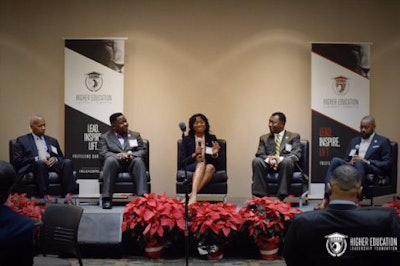 From left to right: Dr. Elwood Robinson, Dr. Franklin Evans, Dr. Tashni-Ann Dubroy, Dr. Roderick Smothers, Dr. Elfred Anthony Pinkard. ( Photo courtesy of higher education leadership foundation)
From left to right: Dr. Elwood Robinson, Dr. Franklin Evans, Dr. Tashni-Ann Dubroy, Dr. Roderick Smothers, Dr. Elfred Anthony Pinkard. ( Photo courtesy of higher education leadership foundation)Talladega College President Dr. Billy Hawkins had some advice for the next generation of HBCU leaders: “Running a college, you’re running an education business enterprise,” he said. “You’ve always got to keep that first.”
Addressing members of the Higher Education Leadership Foundation’s Beta Cohort—a group of higher education professionals in various stages of their careers and with broad-ranging leadership aspirations—in Salisbury, N.C., this week, Hawkins said it is also important for presidential hopefuls to humble themselves and work as part of a team.
“In this position, you have to learn to say ‘my fault, I messed up,’” he said.
“Learn to give credit when credit is due,” Hawkins continued. “It’s not about you. … You have to make decisions that are in the best interest of the institution. … It’s when the president believes it’s all about him, it’s all about her, that’s when they get in trouble. Because no one person can do this by themselves.”
South Carolina State University Interim President Dr. W. Franklin Evans said that “each and every day, just when you think you’ve learned everything there is to learn, something else pops up.”
“As the president, your job does not stop when you leave the office, it does not stop when you’re not on campus or you’re not in front of board members; it is 24-7,” Evans added.
Some of the leaders addressed a topic that is sometimes whispered about but rarely addressed publicly: board dynamics.
“As a young professional, I did not always realize that, behind those doors, what went on with board politics, and even though I took all my higher ed courses and thought I understood the governance component, boards at our schools are different,” said Philander Smith College President Dr. Roderick Smothers, who admitted he “was not prepared for that level of difference.”
Hawkins went a step further, saying, “The success of your presidency will be based on the chair of your board. If you have a great chair, you’ll have a long tenure as president.”
And it is not only board dynamics. Other institutional stakeholders can also be a great hindrance to the leadership of the institution, said Smothers.
“I was not prepared for the level of politics involved and the sometimes nasty and ugly dispositions of some folks in higher ed—all in the name of the movement or advancement of an institution,” Smothers said. “It can be very, very treacherous out there. Treachery in a way that I have not yet figured out how to pray my way through [perpetrated by] educated people who know better.”
Shaw University President Dr. Tashni-Ann Dubroy said that, despite what goes on—whether a tense board meeting or a disciplinary conversation with staff or students—part of the job of the president is to positively represent the university at all times—even in disposition.
“Nobody tells you that you’re going to have to smile for the cameras and for the stakeholders 100 percent of the time … that took some getting used to,” she said. “Because nobody wants to see the face of a president who’s growling or a president who doesn’t have a pleasant disposition.”
Not just smiling for the cameras but being attentive to the needs of staff and students is critical for successful leadership.
“Learn to become a good listener,” Hawkins said. “Oftentimes, just sitting in the president’s seat, people just want to be heard. You will learn a lot in the position and learn a lot about people if you just listen.”
Winston Salem State University Chancellor Dr. Elwood Robinson shared the importance of telling the institution’s own story, not allowing others to tell it for you. Citing a report by the University of North Carolina System (of which WSSU is a member) that found Winston to have the highest job placement among graduates of any system institution, Robinson said it was important that he was first out with that information before anyone else could “put their spin on it.”
The presidents agreed there is a great amount of work to be done on the leadership front to ensure the continued vitality of these storied institutions.
“It just breaks my heart that we’re losing our institutions,” Hawkins said. “We’ve got to do everything we can do to keep our colleges [thriving].”



















